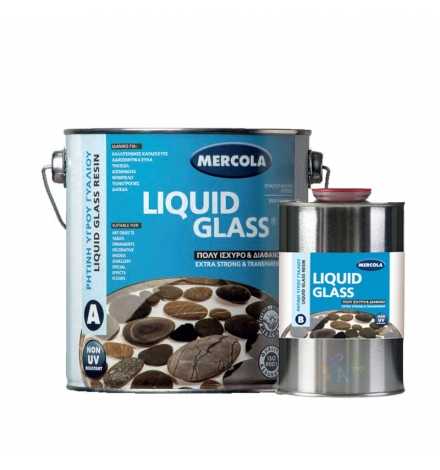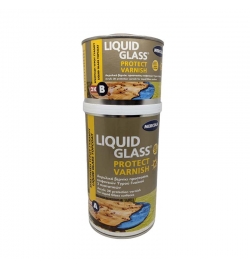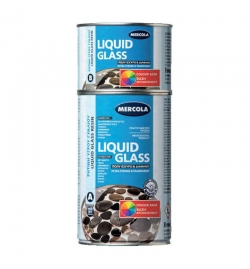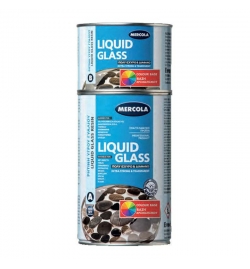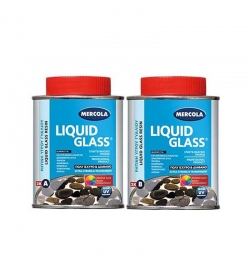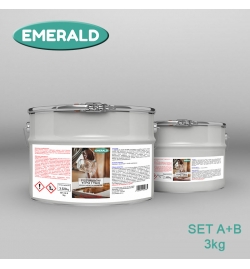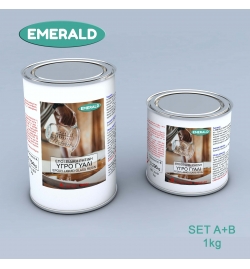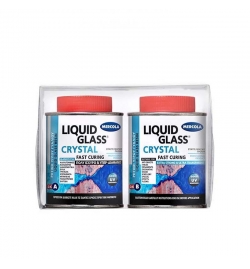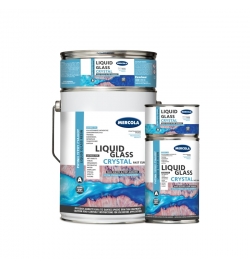LIQUID GLASS is a strong transparent two-component epoxy resin, which offers great resistance to temperature, humidity and solvents. It is ideal for impregnation, molding and clear casting dissimilar materials and ornaments without shrinking. It is ideal for making special decorative – artistic applications with sculptured objects, by filling voids and pores and forming a final glass-like surface. Use LIQUID GLASS to can create fantastic artistic constructions for decoration and use.
ADVANTAGES
- Transparent
- Excellent bonding strength
- Excellent mechanical properties
- High resistance to humidity
- High temperature resistance
- High resistance to most chemicals
APPLICATIONS
- Thousands of applications can be made with any idea and most materials. Tabletops, bowls, serving platters, stools, 3-D displays with leaves, flowers, shells, insects, pebble stones, mineral stones, souvenirs, jewelry, photographs, coins, decorative wood constructions and much more.
- Floor constructions with decorative elements such as pebbles, coins, and many other items.
- LIQUID GLASS Is ideal for protection and decoration of many surfaces such as wood, metal, stone, ceramics, porcelain, cardboard, etc.
- Use your imagination, internet and You Tube for ideas and application methods.
Specifications
- Coverage: 1kg/m²/mm layer thickness
- Thinning: no
- Application: by knife
- Touch dry: 6 - 12 hours 20oC
- Hard dry: 4 - 7 days 20oC
- Interior use
- Application temperature: 10oC - 35oC
- Cleaning: with nitro solvent
INSTRUCTION FOR USE
You must pay close attention to the quantity and the way of mixing the 2 components. Danger of high temperatures due to exothermic reaction.
- All surfaces must be dry and clean from dust and grease.
- Make sure that the materials used for stirring and the dosing and stirring containers are free of moisture. In difficult cases the use of a dehumidifier will help.
- Using a spatula, mix well amounts of LIQUID GLASS Α and hardener Β at a ratio of 100:60 respectively.
- It is advisable to use dosing containers or a precision scale.
- Stir 2 components with a spatula. Never use an electric drill.
- Mix small quantities each time since the mixture will start hardening rapidly. The larger the quantity mixed and the higher the temperature, the faster the rate of acceleration of the curing due to the exothermic reaction. At temperatures higher than 25oC and with quantities mixed larger than 500gr one should spread the mix within 5 - 10 minutes or 15-20 minutes for lower temperatures, always monitoring the temperature of the mix.
- If you apply the material in layers make sure that each layer is applied after basic curing of the previous layer. Alternatively you can apply multiple layers after curing of the previous layer to avoid line creation and reduced transparency.
- If you are using a mould, spray evenly with MINOS SILICONE SPRAY before pouring the mixture to avoid sticking. For moulding purposes one can use melamine surfaces sprayed with silicone, or polyethylene / polypropylene materials (self-adhesive tapes , nylon sheets etc
- Apply the material into the mould making sure that there is no leak..
- During curing one should avoid dust, high temperatures and very importantly high humidity.
- If you are using LIQUID GLASS as a varnish spread material with a spatula.
- Any bubbles can be removed using a needle
- Initial curing takes 4 – 6 hours, and final curing is achieved in 4 - 7 days depending on layer thickness and room temperature.
- Following full curing one can machine – sand the cured object using different grades of sand paper from coarse to fine which will lead to a glass like finish for the sanded areas.
CAUTION
- Humidity affects the chemical process resulting in bubbles. Special care should be paid to applications with wood where it is difficult to measure humidity.
- It is not suitable for exposure to sunlight (UV) although the material presents one of the best UV resistance from most similar products.
- Lightweight objects must be fastened (secured to their intended position ) to avoid floating or moving until final curing.
- Mixing of large quantities and high temperatures rapidly accelerate curing due to exothermic reaction which can lead to bubble formation and discoloration.
- In case of severe overheating with possible smoke release, spray the surface with water to lower the temperature.
- Close lids firmly after use and do not change lids between containers.
- All tests should be carried out before final application in order to ensure the compatibility of the materials to be bonded.
- Suitable for use by professionals or experienced users.
- Please contact our technical support for any technical assistance.
COLOURING LIQUID GLASS
You can colour LIQUID GLASS with the transparent colorants SWAN COLORMIX LIQUID GLASS which allow you to 'see through' the cast piece. The dyes are very concentrated. 2-3 drops might be enough for 50gr of final product.
INSTRUCTION FOR USE
Add just a few drops of colorant in component A (resin). Stir well to blend using a tongue depressor. Special attention must be given to the bottom and sides of the container. Add part B (hardener) and mix well.
Caution: Too much colorant will inhibit the cure of the resin. Colorants may be used to color an entire casting or can be used in the final layer to create a background. Keep in mind that colored resin in your mixing container will look much darker than when poured into a thinner area.
CLEANING
Tools and adhesive residues should be cleaned right after use with nitro solvent.
10393

